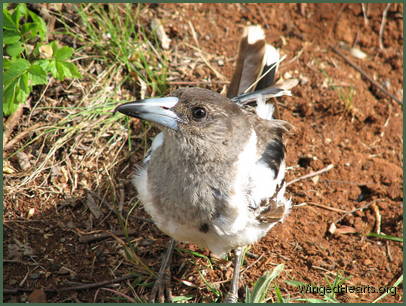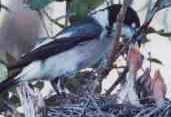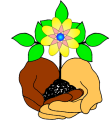To Rescue... Or Not To Rescue A Baby Bird?
What should one do when one finds a baby bird and its parents seem nowhere around?

The answer depends on many factors and is not as simple as we would like it to be. Much depends upon the age/stage of the chick, what type of chick it is and the state of the individual bird and whether it is really orphaned or just appears so.
Here are some quick tips:
1. If the chick is in good condition that is it has not been injured, it is best left alone. Sometimes we find the young birds in awkward places where they can get hurt, like sitting in the middle of the road, in these situations, it is best to gently pick it up and place it in safe place near a bush. The parents are usually around looking for food and will find their chick.
2. The birds parents are the best ones to look after their chicks. All birds need special food and only the parents really know what to find and how to give it to them. Hatchlings and fledgelings usually do not survive without their parents. Mostly due to lack of proper diet, warmth and also because they fret for their family.
3. There are two types of baby birds - Altricial and Precocial. Altiricial chicks are completely helpless, born naked, with eyes shut and depend entirely on their parents (for examples - wrens, magpies, crows, doves and honey eaters). Precocial chicks are born covered in down feathers, eyes open and able to run soon after hatching and can feed themselves. Ducks, lapwings, gulls and geese are examples of precocial birds. People often try to rescue precocial young because they think the bird is uncared for, but this is seldom the case. Artricial hatchlings cannot survive without their parents. Precocial hatchlings can feed themselves, but still need their parents for protection.
4. If you find an orphanded precocial chick, then with expert care these chicks can survive. Click here for an example of lapwings (plovers) chicks being raised by wildlife carers Gabi and Peter. It is important to make sure that the bird is indeed orphaned. Move it to a safe place near a heavy shrub and watch it for a while. If the parents do not return even after an hour or so, then the bird is likely to need help. Consult the wildlife carers in your are to get the best advise on how to raise them.
5. If you find a semi-naked hatchling under a tree, it will most likely be an artricial bird that has fallen out of the nest in a storm. Before re-nesting it, check if it is injured, cold or dehydrated. Does its abdomen and eyes appear to sunken in? Is it lethargic and uninterested in its surroundings? What is neat a dog or cat? Are its parents and siblings dead? Are there flies around it and is it in imminent danger? If any of these are true, then place it in a soft lined box and keep it warm away from all humans and pets. Contact a wildlife carer asap and get the best instructions.
If the answer is no to all of the above, then you can re-nest it. If the parents do not return in an hour, then the baby must be taken to a rehabilitator immediately. In either case, do not attempt to feed the chick no matter how much it begs. The food for these hatchlings are specially processed by the parents and they cannot survive on ordinarily available food.
6. If you find a hurt juvenile bird, then the bird could be rescued. It would be best to take it to the vet for check up and consult wildlife carers in your area re expert advise. In many states, it is illegal to care for wild birds without a permit.
We had a truly amazing experiencing rescuing a babbler chick that was trying to escape from a crow, the slideshow and story is here. We learned a lot about relationships amongst the birds in the wild that day.
Today is the last day when the 23 Amazing Facts About Wild Bird Culture with true stories - click on this link and enter your details
is available as our gift to readers. If you have been amazed by my stories so far you are in for an even bigger treat as the stories there are even more wondrous.
If you have a bird rescue story please share it with us. Send me an email with your story and any pictures and we'll feature it on the website and our Wild Bird Talking ezine.
Until tomorrow,
Cheers
Gitie

 del.icio.us
del.icio.us Digg
Digg Facebook
Facebook Google
Google Google+
Google+ LinkedIn
LinkedIn MySpace
MySpace Ping This!
Ping This! SlashDot
SlashDot StumbleUpon
StumbleUpon Twitter
Twitter Yahoo
Yahoo




Comments
Baby Birds
Hi Gitie,
What a great resource you are! It never occurred to me that some baby birds were born in a "more complete" state than others even though I have seen them.
This is good information on whether to rescue or not. I'm going to stumble this article so more people can get this info.
Thank you!
Kathryn
They can fly long before they
They can fly long before they can feed themselves. For some weeks after leaving the nest (they hop around on the branches for a while) they have to have food put into their mouths by mum or dad.70-693 They are insectivores, and when we had to take care of one of our adult butcherbirds for ten days, we fed her mealworms, available at certain pet shops. 83-640 Temporarily, a bit of grated cheese will do a bit of good. You could try putting it in with tweezers to simulate the parent's beak.
have baby bird food
I attempted to rescue a baby bird whose mother was dying then died and he was just so sad--I watched him rubbing his mothers head as she was dying...I picked them both up and placed them out of the sidewalk with lots of traffic--got the dried worms and bird formula for the baby after mom died, fed him two days, but he died. I have most of the food left-is there some place that wants it? It was $30 worth, maybe some organization can use it????I am in chatsworth, ca